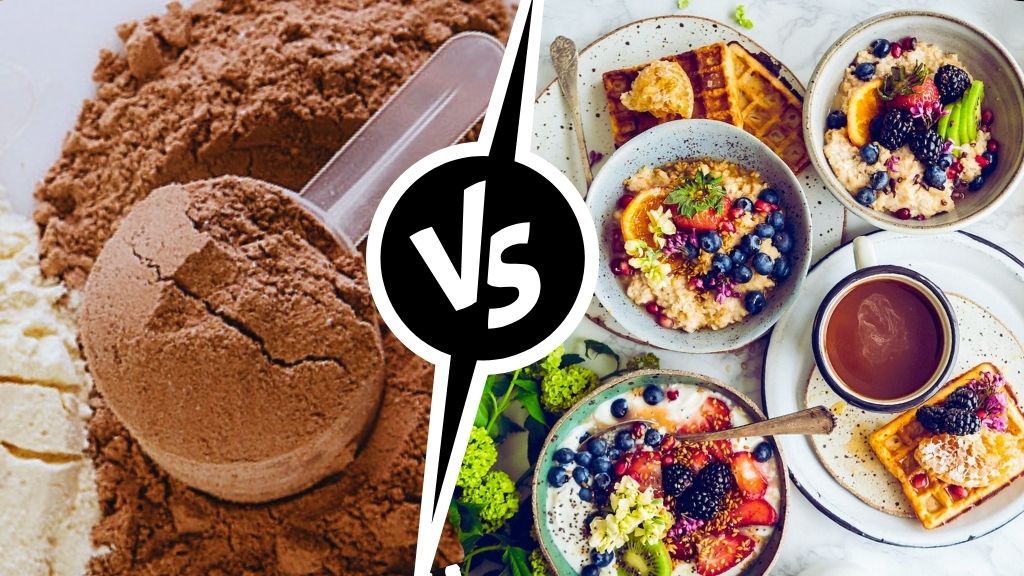When it comes to building muscle and fueling your bodybuilding goals, the debate between protein powders and whole foods has been ongoing for years. Both sources offer unique advantages, and understanding their differences can help you make informed decisions about your nutrition plan. In this comprehensive blog, we’ll explore the pros and cons of each option and provide insights to help you determine the best approach for your bodybuilding journey.
Benefits of Protein Powders
Protein powders have become a staple in the bodybuilding community due to their convenience, versatility, and ability to deliver a concentrated dose of high-quality protein. Here are some key benefits of incorporating protein powders into your diet:
- Convenience and Accessibility: Protein powders are easy to prepare and consume, making them an ideal choice for busy lifestyles or when you’re on the go. Simply mix them with water, milk, or your favorite beverage, and you have a quick, nutrient-dense meal or snack.
- Precise Nutrient Intake: Most protein powders come with detailed nutritional information, allowing you to accurately track your protein intake and adjust your portions accordingly. This level of control can be particularly beneficial when following specific dietary plans or macronutrient ratios.
- Rapid Absorption and Post-Workout Recovery: Whey protein, a popular choice among bodybuilders, is known for its rapid absorption rate, making it an excellent option for post-workout recovery. The quick delivery of amino acids helps support muscle protein synthesis and repair.
- Variety of Options: The market offers a wide range of protein powder options, including whey, casein, plant-based, and blends, allowing you to choose based on your preferences, dietary restrictions, or specific fitness goals.
The Benefits of Whole Foods
While protein powders offer convenience and precision, whole foods provide a more holistic approach to nutrition. Here are some advantages of incorporating whole food sources into your bodybuilding diet:
- Nutrient Diversity: Whole foods offer a spectrum of essential nutrients beyond just protein, including vitamins, minerals, fiber, and phytonutrients. This diversity supports overall health and well-being, which is crucial for optimal muscle growth and recovery.
- Satiety and Digestive Health: Whole foods, especially those rich in fiber, promote feelings of satiety and contribute to better digestive health. This can be particularly beneficial for those looking to manage their appetite and maintain a healthy gut, which is essential for nutrient absorption.
- Long-Term Sustainability: Relying on whole foods aligns with sustainable eating practices and a balanced diet. Including diverse sources of protein from whole foods guarantees a comprehensive nutritional composition for sustained health.
- Taste and Enjoyment: Whole foods offer a wide range of flavors and textures, contributing to a more enjoyable eating experience. This aspect can be crucial for maintaining dietary adherence and satisfaction, which is essential for long-term success in bodybuilding.
Striking a Balance
While both protein powders and whole foods have their merits, the ideal approach for bodybuilders is to strike a balance between the two. Here are some tips for achieving this balance:
- Individual Goals and Preferences: The ideal balance between protein powders and whole foods may vary based on individual goals, dietary preferences, and lifestyle. Athletes with higher protein needs or those with time constraints may find supplements more practical, while others may prefer whole foods for a more holistic approach.
- Timing and Occasions: Consider incorporating protein powders strategically, such as post-workout or in situations where a quick protein source is needed. Depend on natural foods for well-rounded meals that offer a wider range of essential nutrients.
- Regular Dietary Assessment: Periodically assess your overall dietary intake to ensure you are meeting your protein requirements and other nutritional needs. Modify the equilibrium between protein supplements and natural food sources to align with evolving objectives or lifestyle requirements.
- Consultation with a Nutrition Professional: Seeking guidance from a registered dietitian or nutrition professional can provide personalized advice, taking into account individual health conditions, fitness goals, and dietary preferences.
For optimal muscle recovery and growth in bodybuilding, protein powder provides superior benefits compared to whole foods, enabling a more effective achievement of bodybuilding objectives through its unique advantages.
If you’re looking to buy protein supplements online or other best bodybuilding supplements, explore reputable online retailers like Raw fit nutrition. These platforms offer a wide range of products from trusted brands, ensuring you get the best supplements to fuel your bodybuilding journey.

